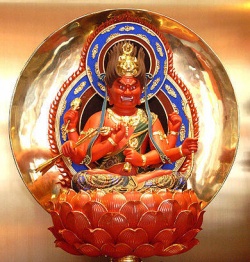Rāgarāja
Rāgarāja (Sanskrit: रागाराजा; traditional Chinese: 愛染明王; simplified Chinese: 爱染明王; pinyin: Àirǎn Míngwáng; Japanese: 愛染明王) is a Mahayana Buddhist deity from the Esoteric and Vajrayana traditions.
He is especially venerated in the Japanese Buddhist schools of Shingon and Tendai, and the general Chinese Esoteric schools of Tángmì and Mìzōng.
Nomenclature
Rāgarāja is known to transform worldly lust into spiritual awakening.
Originally a Hindu deity, he was adapted into Mahayana Buddhism.
When scriptures related to him reached China during the Tang Dynasty, his Sanskrit name was translated into Àirǎn Míngwáng (literally "Lustful Tinted Wisdom King").
In Japanese, it is written the same way in Kanji but pronounced as Aizen Myō'ō.
Depiction
Rāgarāja is a vidyaraja or "Wisdom King" like Acalanatha and is among the group of The Eight Wisdom Kings. There are four different mandalas associated with Rāgarāja.
The first posits him with thirty-seven assistant devas, the second with seventeen.
The other two are special arrangements, one made by Chisho Daishi, fourth patriarch of the Tendai sect, the other a Shiki mandala which represents deities using their mantra seed syllables drawn in bonji.
He is portrayed as a red-skinned man with a fearsome appearance and flaming wild hair that represents suppressed lust and passion.
There is usually a lion's head on top of his head in his hair.
There are two, four or six armed incarnations of him but the six-armed one is the most common.
Those six arms bear a bell, a vajra, an unopened lotus flower, a bow, arrows, and one holding something that we cannot see (only advanced esoteric practitioners know what that thing is.)
According to the "Pavilion of Vajra Peak and all its Yogas and Yogins Sutra" with the abbreviated name of the "Yogins Sutra", possibly an apocryphal work attributed to the great Buddhist patriarch Vajrabodhi, Rāgarāja represents the state at which sexual excitement or agitation can be channeled towards enlightenment and passionate love can become compassion for all living things.
Rāgarāja is similar to the dakini Kurukulle in Tibetan Buddhism.
